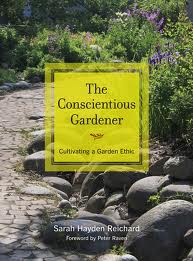 Sarah Reichard, the late Director of the University of Washington Botanic Gardens, is also the author of an important book for gardeners: The Conscientious Gardener: Cultivating a Garden Ethic. In reviewing this book, I must make a full disclosure–Sarah is also my new boss and someone I’ve known and worked with for many years.
Sarah Reichard, the late Director of the University of Washington Botanic Gardens, is also the author of an important book for gardeners: The Conscientious Gardener: Cultivating a Garden Ethic. In reviewing this book, I must make a full disclosure–Sarah is also my new boss and someone I’ve known and worked with for many years.
Reichard rightfully challenges gardeners to think outside of our individual gardens and see our role in the bigger system of both human endeavors and the natural world, and to see both the good and bad we can do. But she knows that being “good” isn’t easy! And being a long-time teacher, she uses a skillful blend of storytelling, humor, and breaking things down to easy steps to make her message understood but not overwhelming.
For example, in her chapter “Aliens among Us”, Reichard begins with the story of her concerns about introducing invasive plant species during a seed collecting trip early in her career. The scarcity of existing research led her to become a leader in the study of what makes plants invasive and the establishment and advocacy of guidelines for plant introductions in horticulture.
Recounting all this could be pretty heavy going, but she keeps it succinct and lightened with side boxes such as the role of the automobile (“Driving the Daisy”) in seed dispersion. Then, she both encourages, “Gardeners, take action!”, and tells how to do it, “Read on to plan your attack!” Like all chapters, this one ends with a set of Guidelines, very practical and doable steps each of us can take.
Excerpted from the Fall 2011 Arboretum Bulletin, by Brian Thompson.
Professor and UW Botanic Gardens director Sarah Reichard has her finger on the pulse of the planet in this erudite and accessible book. For those who have become complacent and fixed in their gardening ways, or for those just emerging as gardeners, there is much to learn in this handsome, information-rich volume. Are native plants always the preferred choice in our gardens? Do we really need soil amendments? Are we putting things on our lawns and landscapes that pollute nearby waters? What about those worms making compost in our worm bins: might they be invasive? Readers will discover that doing the right thing in our gardens is not only simpler than one might imagine, but deeply rewarding both personally and globally.
If you have been a persistent (but always polite!) thorn in the side of less conscientious (or simply unaware) gardeners and businesses who are purveyors of ivy and loosestrife, spreaders of weed-and-feed, and sprayers of pesticides, you will feel vindicated! If you have never spoken out before, you will feel inspired to do so! Reichard’s clearheaded call to action is well worth heeding.
Reviewed by Plant Answer Line librarian Rebecca Alexander, April 2011.